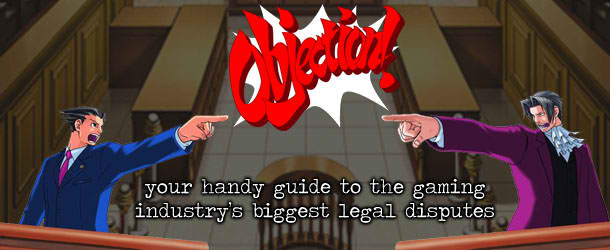
The video game industry's a big business -- and sometimes, companies don't see eye-to-eye. And what happens when a dispute goes to court, and gamers get their grubby hands on fancy-sounding legal documents? Why, wild, inane, forum-fueled speculation, of course. That's where California-based corporate attorney and GameSpy writer Eric Neigher comes in. Objection! is your one-stop destination to learn what all that legalese means in plain English, straight from someone who knows the twisty-turny language of the law.
Introduction
Senate bill 978 (called S.978 for short) is going to be a pain in the ass, if it passes. If you haven't heard about it, it's a putative law being considered on the Senate floor right now that will totally alter the landscape of the Internet, especially with regard to gamers, movie and TV buffs, and sports fans. Essentially, S.978 would make it a felony to "stream" (which, by definition, would include posting videos to YouTube or on your favorite gaming site/blog) any copyrighted content without the express permission of the copyright holder.
No more awesome Super Mario Bros. 3 speedruns!
How would it do this? Well, we'll get into the particulars in a second, but I need to cover some high school civics lesson stuff first: Unlike much of what I discuss here in Objection!, this is not a judicial matter. That is, it's not a case brought before a court to be argued on Constitutional or other fairness grounds. This is a bill that will be voted on by the Senate and eventually the House, and will presumably need to be signed by the President to go into effect. A point will come where it will no doubt have to withstand some form of Constitutional scrutiny in the courts, but for now, that's outside the scope of what's going on here. Basically, it's going to come down to a popular vote -- so I want to try to help you understand what this law says, so you may formulate an opinion on what you might want to express to your Senator about how you think they should vote on this bill. I'll briefly touch on the Constitutional issues at the end though, because hell, this is America -- everything should be about the Constitution at some point.
Facts
The bill proposes some changes to the way that "performances" of copyrighted media are allowed, and what the punishments for violating the new rules will be. Specifically, anyone who makes a "performance" -- which the law is pretty vague about defining, but which would almost certainly include posting a video on YouTube or your blog -- of any copyrighted material will be subject to the teeth of this law. That includes not only performing yourself (such as your band covering a copyrighted song, or you and a friend recording a gameplay session and sharing it with others), but also rebroadcasting other people doing the performing (such as a tutorial video for your favorite game, or a clip of a movie or TV show). Again, the law and its specific restrictions are pretty vague here (probably unconstitutionally so -- see below), but this could cover a whole gamut of possible video types, and might well turn YouTube into a ghost town for non-corporate-sanctioned stuff.
No more League of Legends pro tips!
Now, in order to run afoul of this law, you've got to also make 10 or more performances within a 180-day period. But don't make the mistake of thinking this means 10 uploads. What it refers to, ultimately, is views of a video. So, obviously, this is going to make sharing videos of your gaming sessions, cheats, or neat achievements pretty tough unless you have no friends, or unless you share on an untrackable private network -- totally defeating the purpose of the Internet as we know it.
OK, so now we've got the number of showings and what constitutes a performance down, but I have a couple other little things to straighten out, too. First of all, this copyright infringement has to be willful; that is, the alleged infringer has to have intended to do it. Well, that's not exactly true, either: Actual intent is one thing, but just doing it with "reckless disregard" to the likelihood of breaking the law also counts. So, if you put up a video and it somehow gets 11 hits, despite the fact that you meant to share it privately only with your clan buddies, you could still be in trouble... even if you didn't really expect to disseminate the content over a wide audience.
However, one fairly stringent category is that anyone posting these "performances" has got to make some sort of personal gain -- at least $2,500 -- as a result of the copyright infringements. While that may be bad news for GameSpy, you're thinking, how does it affect me as a humble civilian, posting on YouTube? Well, here's the catch: It's not just that you've got to make money. You can also be liable if you cause a monetary loss to the copyright holder as a result of your performances. So, if you upload a video of yourself kicking ass at Street Fighter IV, and Capcom can show that a certain number of people would've gone to their site for this kind of video as a regular practice, and would've done so in the case of your gameplay video (but for the fact that you uploaded it yourself), you would fall into the crosshairs of this law. This also covers ads on your website that generated money, even if they weren't directly on the page with the video embedded on it.


